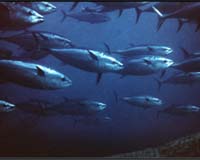| . |  |
. |
Wellington (AFP) Dec 13, 2010 A South Korean trawler sank suddenly and without warning off Antarctica Monday, killing up to 22 fishermen, with its owners saying it may have collided with an iceberg. Rescuers said the 22 men from the No. 1 Insung had no chance to don protective gear as they scrambled to escape the trawler and were presumed dead as they had only 10 minutes' survival time in the icy waters. The trawler went down so fast it did not even have a chance to send an SOS before plunging to the depths of the Southern Ocean, Maritime New Zealand said. Insung Corporation spokesman Ryan Kim said the company was trying to understand what happened. "The boat sank in about 30 minutes. We are trying hard to find the reason why it sank so quickly," he told AFP. "We believe the vessel might have been hit by an iceberg or a strong wave, although we have yet to secure any evidence of this. We are now collecting information from the surviving crew." Another trawler plucked 20 fishermen from the sea shortly after the ship sank about 6:30am (1730 Sunday GMT) but the rest of the 42-strong crew had only minutes to live without proper immersion suits. Five died immediately and rescuers initially hoped some of the 17 missing had reached a lifeboat. Maritime New Zealand coordinated desperate efforts by five trawlers to search the remote area 1,000 nautical miles north of the McMurdo Antarctic base and 1,500 nautical miles from New Zealand's southern tip. But rescue controller Dave Wilson admitted defeat late Monday, saying "it was increasingly unlikely further survivors would be found". Maritime NZ spokesman Ross Henderson said the boat appeared to have gone down in calm conditions and did not send an SOS. "We had no distress signal. At this stage we don't know what caused the vessel to sink," he told AFP. "There was no emergency communication or beacon alert of any type, which we would normally expect in these sort of situations. We don't know what the reason for that is." A coastguard spokesman in the southern South Korean port of Busan, where the ship is based, told AFP there were eight Koreans, eight Chinese, 11 Indonesians, 11 Vietnamese, three Filipinos and one Russian on board. Chinese state media said there were four Chinese among the missing, but the other victims' nationalities were unknown. The waters around Antarctica are notoriously rough but Henderson said conditions Monday consisted of light 10 knot winds and a one-metre (3.3-foot) swell. He said New Zealand, which is in charge of rescue operations in the area, was not informed of the accident until 1:00pm, about six and a half hours after it occurred. Plans to send a Royal New Zealand Air Force long-range Orion plane were "not viable" because it would take at least eight hours to reach the location and the crew members would certainly be dead by then, Henderson said. The 20 survivors and bodies were on another South Korean fishing vessel, No. 707 Hongjin. The stricken trawler was fishing for Patagonian toothfish, a rare species that lives in waters so cold that Greenpeace says it has a form of anti-freeze in its blood. The fish, marketed as Chilean seabass, is popular in South America, the US and Japan and is often illegally caught. Greenpeace, which says the Patagonian toothfish is known as "white gold" in the industry for its highly valued flesh, lists it as a species in danger of being unsustainable. The Commission for the Conservation of Antarctic Marine Living Resources (CCAMLR), the global body overseeing fishing in Antarctic waters, said Insung had submitted papers to renew the trawler's licence just before it sank. The No.1 Insung was one of seven South Korean vessels licensed to fish in the Southern Ocean, five of which were hunting toothfish, CCAMLR said. "The Korean fleet is not the dominant fleet but it's one of the major operators in the Southern Ocean targeting toothfish," CCAMLR director Andrew Wright told AFP. It had a permit to trawl Antarctic waters until June 2014.
Share This Article With Planet Earth
Related Links Water News - Science, Technology and Politics
 Bluefin tuna catches to be reduced in Pacific: reports
Bluefin tuna catches to be reduced in Pacific: reportsTokyo (AFP) Dec 12, 2010 Fishing nations have agreed to hold their catches of young bluefin tuna in the central and western Pacific in 2011 and 2012 below the 2002-2004 annual averages, press reports said Sunday. The agreement was reached at an annual meeting of the 25-member Western and Central Pacific Fisheries Commission, which ended in Honolulu, Hawaii, on Saturday Japan time, the reports said. It was the fi ... read more |
|
| The content herein, unless otherwise known to be public domain, are Copyright 1995-2010 - SpaceDaily. AFP and UPI Wire Stories are copyright Agence France-Presse and United Press International. ESA Portal Reports are copyright European Space Agency. All NASA sourced material is public domain. Additional copyrights may apply in whole or part to other bona fide parties. Advertising does not imply endorsement,agreement or approval of any opinions, statements or information provided by SpaceDaily on any Web page published or hosted by SpaceDaily. Privacy Statement |